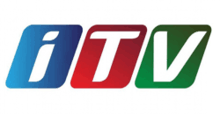İctimai Television
| İctimai Televiziya ("Public Television") | |
|---|---|
 | |
| Launched | 29 August 2005 |
| Owned by | Public Television and Radio Broadcasting Company (statutory corporation) |
| Picture format | 16:9 |
| Country | Azerbaijan |
| Website |
www |
İctimai Television (Azerbaijani: İctimai Televiziya, "Public Television") Azerbaijani pronunciation: [itʃtimɑˈi teleˈvizijɑ] or İTV is a public television channel in Azerbaijan. It began broadcasting on 29 August 2005 after being created by law in 2004 as the first independent public broadcaster in Azerbaijan.[1] The channel is based in Baku.
İTV is primarily funded through advertising and government payments.[2][3] The 2004 law creating the channel called for funding to come from a television licence fee beginning in 2010,[2][4] but this portion of the law has yet to be implemented.[5]
The channel is operated by the Public Television and Radio Broadcasting Company (Azerbaijani: İctimai Televiziya və Radio Yayımları Şirkəti), which consists of a nine-member council, whose members are approved by the President of Azerbaijan, and a director general elected by the council and also approved by the president.[1][6] This arrangement, as well as the continued state financing, has been subject to criticism by non-governmental organizations on the grounds that the channel may be too closely connected to the government to be fully independent and unbiased.[7][8][9]
İTV became a member of the European Broadcasting Union on 5 July 2007, allowing it to take part in events such as the Eurovision Song Contest, which it entered for the first time in 2008.[10] Following Azerbaijan's win in the Eurovision Song Contest 2011, İTV hosted the 2012 competition in Baku. The broadcaster was also supposed to host the Third Eurovision Dance Contest in Baku,[11] but this event was postponed indefinitely due to a lack of participants.
References
- 1 2 "Television Channels in Azerbaijan". Ministry of Culture and Tourism of Azerbaijan Republic. Retrieved 26 March 2014.
- 1 2 "The Law of Azerbaijan Republic on Public TV-Radio Broadcasting" (PDF). 2004. Retrieved 26 March 2014.
- ↑ Hajili, Rashid (2012). Hug, Adam, ed. "Freedom of Media in Azerbaijan" (PDF). Spotlight on Azerbaijan. London: Foreign Policy Centre: 41.
- ↑ Golovanov, Dmitry. "Azerbaijan : Public Broadcasting Introduced". IRIS Legal Observations. European Audiovisual Observatory. Retrieved 26 March 2014.
- ↑ "Funds for Azerbaijan Television and Radio Broadcasting Company to be increased". Azeri-Press Agency. 19 October 2013. Retrieved 26 March 2014.
- ↑ "Azeri parliament passes controversial broadcasting law". International Journalists' Network. Sitemap International Center for Journalists. 16 January 2004. Retrieved 25 March 2014.
- ↑ Azerbaijan and the European Union: A Policy Dilemma (PDF). Institute for Reporters' Freedom and Safety. September 2013. p. 17. Retrieved 26 March 2014.
- ↑ Huseynov, Emil (2012). "Freedom of Expression in Azerbaijan: The Internet as the last island of freedom". Pluralism and Internet Governance (PDF). Organization for Security and Co-operation in Europe (OSCE). p. 90. ISBN 978-92-9234-642-3. Retrieved 26 March 2014.
- ↑ Kazimova, Arifa (18 March 2011). "Media in Azerbaijan: The Ruling Family Dominates TV, the Opposition Has Some Papers" (PDF). Caucasus Analytical Digest. Swiss Federal Institute of Technology Zurich: Center for Security Studies (25): 5. Retrieved 26 March 2014.
- ↑ Sand, Jon Ola (2011). "Winners All Around". The Business Year. Retrieved 26 March 2014.
- ↑ Bakker, Sietse (2 February 2009). "Dance Contest 2009 to Baku, Azerbaijan". Eurovision.tv. European Broadcasting Union. Retrieved 26 March 2014.
External links
- Official website (Azerbaijani)